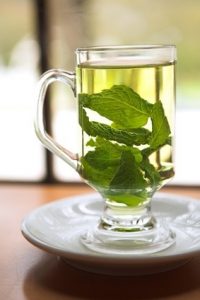Can that cup of hot tea help you reduce your risk of cancer? There’s a lot of research on the topic – much of it promising, as today an article in the Washington Post highlights.
The latest study on the topic also points to tea’s protective effect. This study focused on cancers affecting the digestive system, such as cancers of the colon and esophagus. Women who drink three or more cups of tea each week may have lower risk of digestive system cancers, the study suggests. At least for Chinese women who don’t smoke or drink alcohol.
The study was published in the American Journal of Clinical Nutrition.
This new study is a large one, analyzing data from almost 70,000 women who were part of the Shanghai Women’s Health Study. The women were 40 to 70 years old at the start; that was when they answered questions about how much tea they typically drink, along with other lifestyle habits. Every two to three years, the women again answered questions about their diet, physical activity, weight and lifestyle habits.
Over a quarter of the women – 28 percent – were regular tea drinkers. For this study, that means the women drank at least three cups of tea a week for at least six months. (The vast majority drank green tea.)
After 11 years, researchers found that regular tea drinkers had a 14 percent reduced risk of all digestive system cancers combined, compared to non-tea drinkers. Drinking two to to three cups daily — as opposed to three cups weekly — reduced their risk even more: 21 percent. This is after the researchers took into account their diet, exercise, family history of cancer and other risk factors. They did not find any link between tea and the individual cancers, which included stomach, esophagus, colorectal, liver, pancreas, and gallbladder/bile duct.
Then the scientists looked at the effects among women who drank tea for at least two decades, and the findings were even stronger. Compared to the non-tea drinkers, women who drank tea for 20 or more years had a 27 percent reduced risk of digestive system cancers. They also found that long-time tea drinkers had a 29 percent reduced risk of colorectal cancer.
As the authors note, that supports the potential importance of long-term, cumulative effect of tea in reducing the risk of colorectal cancer, which can develop over decades.
This is a big one, but it is one study. A lot of the research relating to tea and cancer also occurs among Asian populations, where tea is a staple. But scientists working in the lab know that teas are packed with phytochemicals, such as the well-studied epigallocatechin-3-gallate (EGCG). Lab studies show these phytochemicals act as antoxidants and display cancer-fighting actions.
What is known is there’s no downside to drinking tea: green, black or decaffeinated. If you want to know the difference between them, and find out what white tea is, read our Research in Your Cup.





